Critical Essay: Human Resource Operations in the Service Sector
VerifiedAdded on 2022/09/09
|8
|1922
|35
Essay
AI Summary
This essay critically examines human resource operations within the service sector, focusing on traditional recruitment and selection methods. It analyzes the shift towards prioritizing soft skills, personality, and attitude in hiring processes, contrasting these approaches with the 'scientific selection process'. The essay delves into the techniques, constraints, and legal and ethical issues surrounding these methods, including discussions on validity, reliability, and the definitions of key terms. It explores the implications of selecting staff based on personality and attitude, considering both the benefits and potential drawbacks within the context of the service industry. The analysis incorporates academic research and references to legal and ethical requirements, providing a comprehensive overview of current practices and challenges in staffing the service sector.
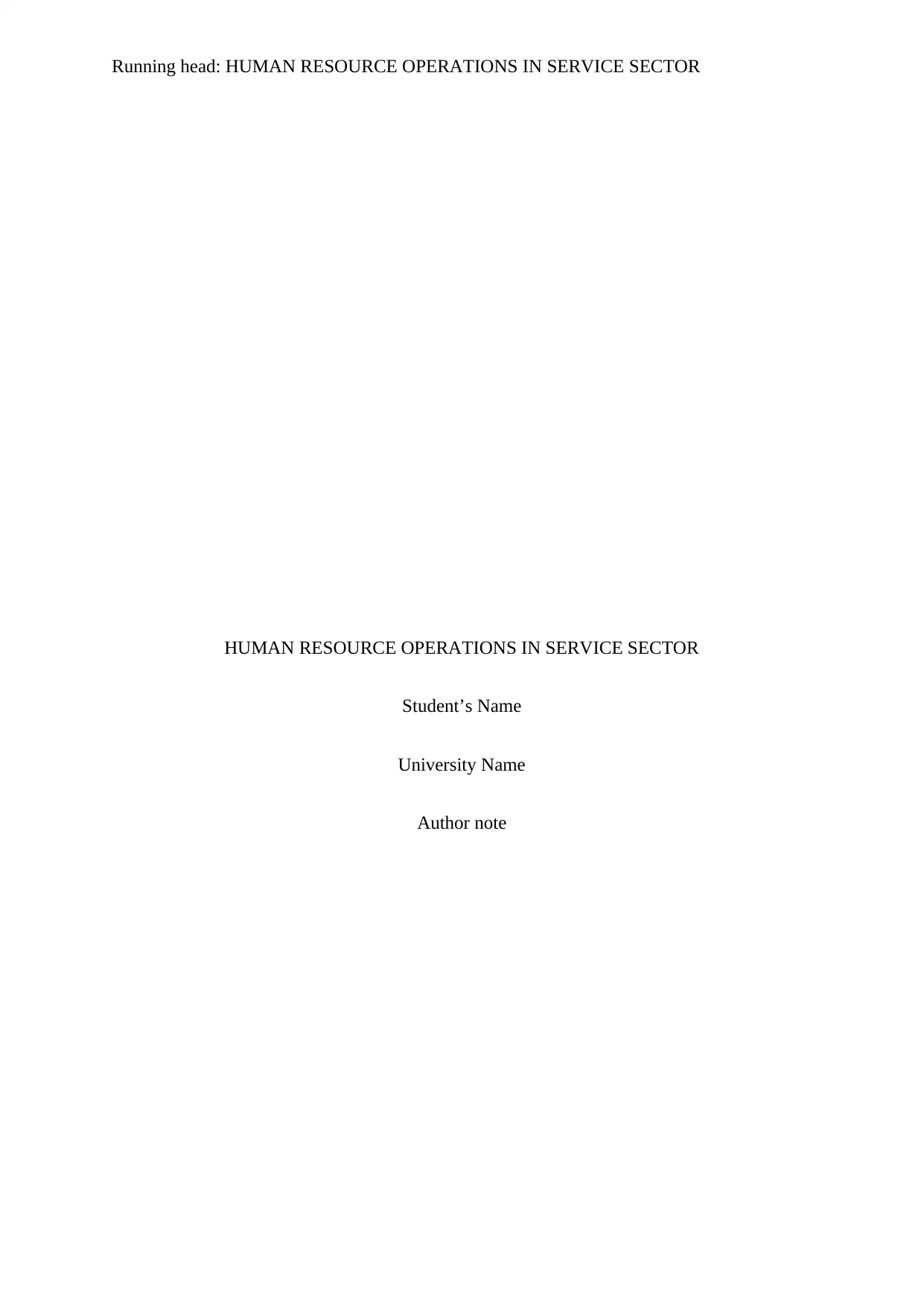
Running head: HUMAN RESOURCE OPERATIONS IN SERVICE SECTOR
HUMAN RESOURCE OPERATIONS IN SERVICE SECTOR
Student’s Name
University Name
Author note
HUMAN RESOURCE OPERATIONS IN SERVICE SECTOR
Student’s Name
University Name
Author note
Paraphrase This Document
Need a fresh take? Get an instant paraphrase of this document with our AI Paraphraser
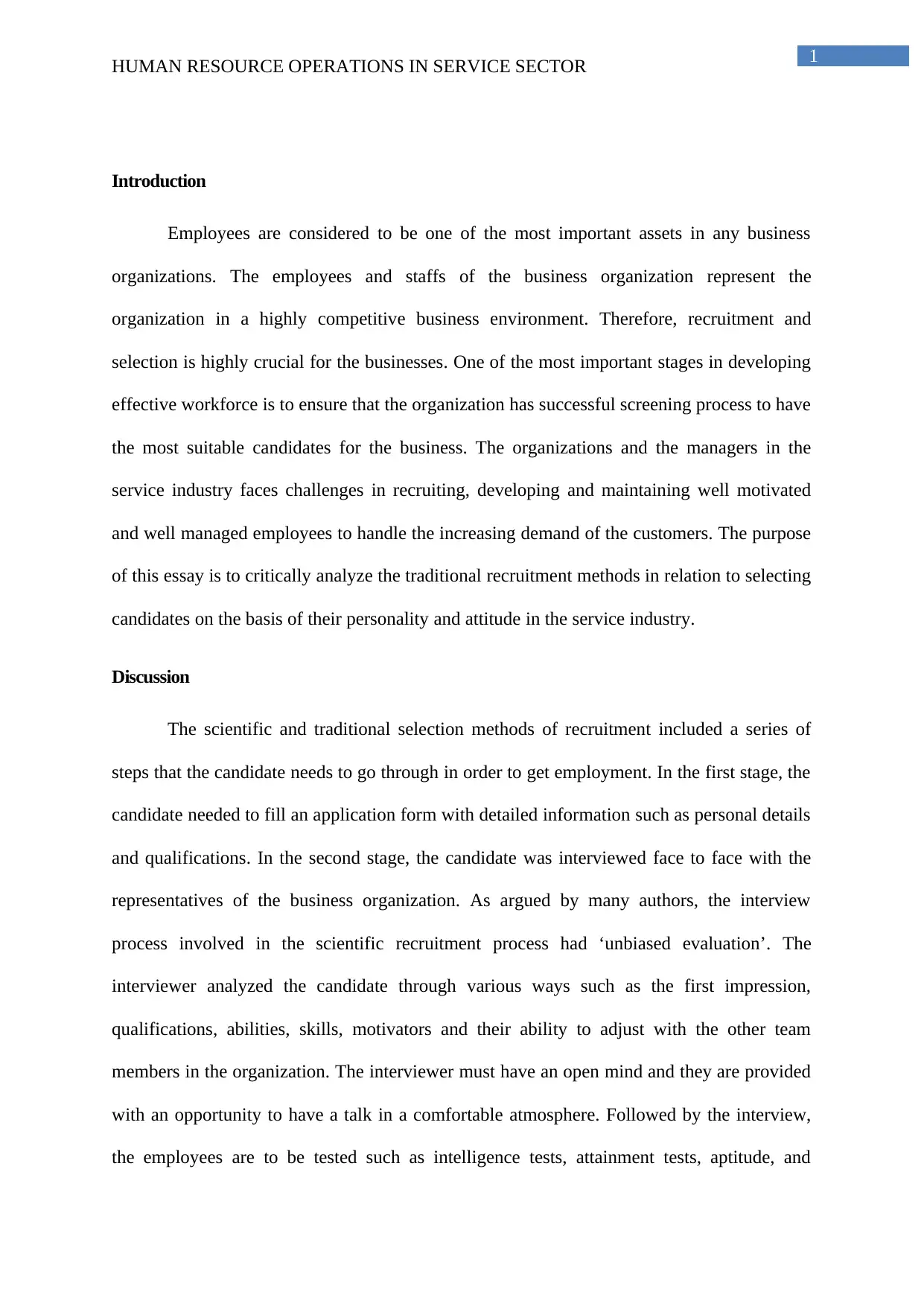
1
HUMAN RESOURCE OPERATIONS IN SERVICE SECTOR
Introduction
Employees are considered to be one of the most important assets in any business
organizations. The employees and staffs of the business organization represent the
organization in a highly competitive business environment. Therefore, recruitment and
selection is highly crucial for the businesses. One of the most important stages in developing
effective workforce is to ensure that the organization has successful screening process to have
the most suitable candidates for the business. The organizations and the managers in the
service industry faces challenges in recruiting, developing and maintaining well motivated
and well managed employees to handle the increasing demand of the customers. The purpose
of this essay is to critically analyze the traditional recruitment methods in relation to selecting
candidates on the basis of their personality and attitude in the service industry.
Discussion
The scientific and traditional selection methods of recruitment included a series of
steps that the candidate needs to go through in order to get employment. In the first stage, the
candidate needed to fill an application form with detailed information such as personal details
and qualifications. In the second stage, the candidate was interviewed face to face with the
representatives of the business organization. As argued by many authors, the interview
process involved in the scientific recruitment process had ‘unbiased evaluation’. The
interviewer analyzed the candidate through various ways such as the first impression,
qualifications, abilities, skills, motivators and their ability to adjust with the other team
members in the organization. The interviewer must have an open mind and they are provided
with an opportunity to have a talk in a comfortable atmosphere. Followed by the interview,
the employees are to be tested such as intelligence tests, attainment tests, aptitude, and
HUMAN RESOURCE OPERATIONS IN SERVICE SECTOR
Introduction
Employees are considered to be one of the most important assets in any business
organizations. The employees and staffs of the business organization represent the
organization in a highly competitive business environment. Therefore, recruitment and
selection is highly crucial for the businesses. One of the most important stages in developing
effective workforce is to ensure that the organization has successful screening process to have
the most suitable candidates for the business. The organizations and the managers in the
service industry faces challenges in recruiting, developing and maintaining well motivated
and well managed employees to handle the increasing demand of the customers. The purpose
of this essay is to critically analyze the traditional recruitment methods in relation to selecting
candidates on the basis of their personality and attitude in the service industry.
Discussion
The scientific and traditional selection methods of recruitment included a series of
steps that the candidate needs to go through in order to get employment. In the first stage, the
candidate needed to fill an application form with detailed information such as personal details
and qualifications. In the second stage, the candidate was interviewed face to face with the
representatives of the business organization. As argued by many authors, the interview
process involved in the scientific recruitment process had ‘unbiased evaluation’. The
interviewer analyzed the candidate through various ways such as the first impression,
qualifications, abilities, skills, motivators and their ability to adjust with the other team
members in the organization. The interviewer must have an open mind and they are provided
with an opportunity to have a talk in a comfortable atmosphere. Followed by the interview,
the employees are to be tested such as intelligence tests, attainment tests, aptitude, and
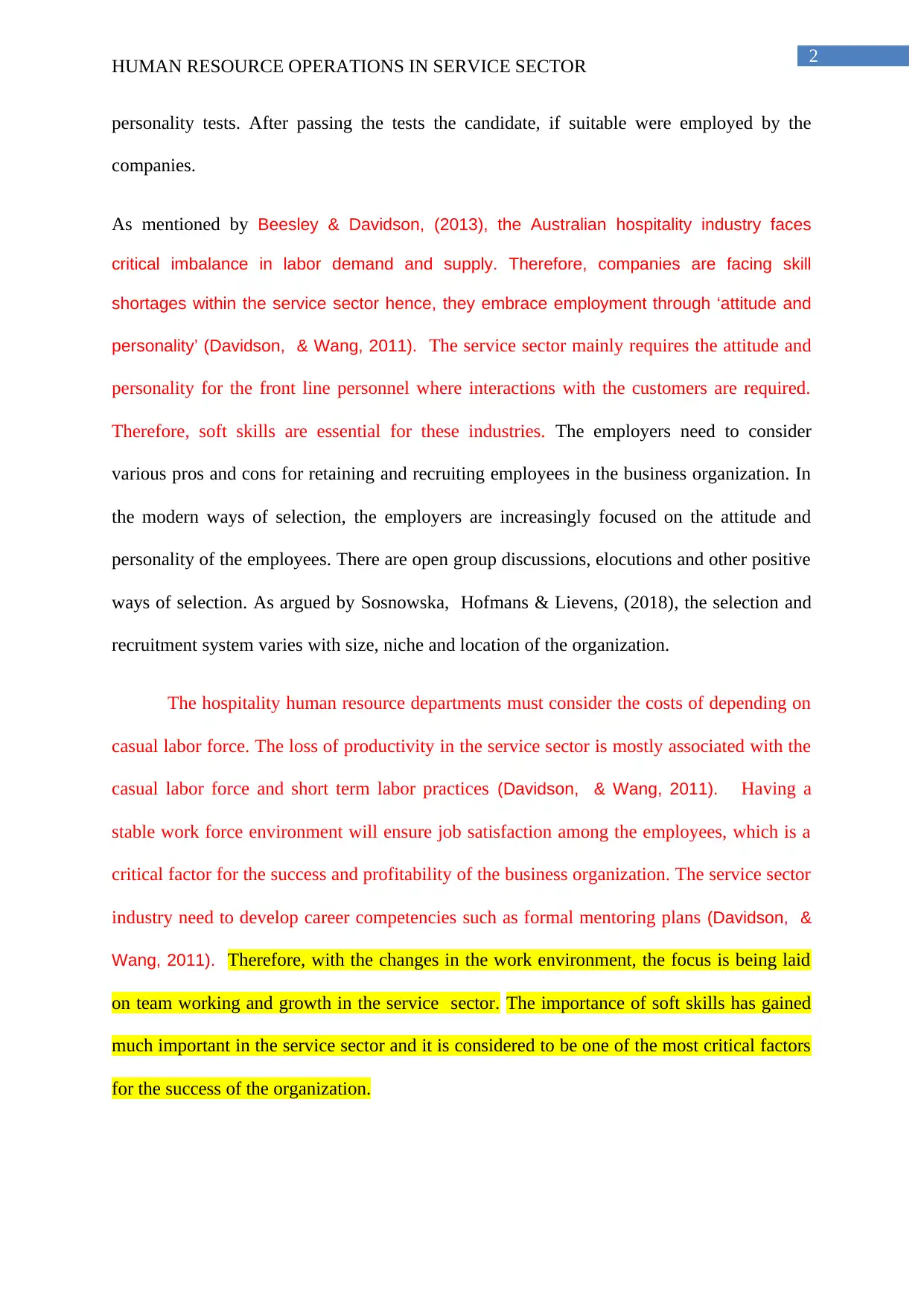
2
HUMAN RESOURCE OPERATIONS IN SERVICE SECTOR
personality tests. After passing the tests the candidate, if suitable were employed by the
companies.
As mentioned by Beesley & Davidson, (2013), the Australian hospitality industry faces
critical imbalance in labor demand and supply. Therefore, companies are facing skill
shortages within the service sector hence, they embrace employment through ‘attitude and
personality’ (Davidson, & Wang, 2011). The service sector mainly requires the attitude and
personality for the front line personnel where interactions with the customers are required.
Therefore, soft skills are essential for these industries. The employers need to consider
various pros and cons for retaining and recruiting employees in the business organization. In
the modern ways of selection, the employers are increasingly focused on the attitude and
personality of the employees. There are open group discussions, elocutions and other positive
ways of selection. As argued by Sosnowska, Hofmans & Lievens, (2018), the selection and
recruitment system varies with size, niche and location of the organization.
The hospitality human resource departments must consider the costs of depending on
casual labor force. The loss of productivity in the service sector is mostly associated with the
casual labor force and short term labor practices (Davidson, & Wang, 2011). Having a
stable work force environment will ensure job satisfaction among the employees, which is a
critical factor for the success and profitability of the business organization. The service sector
industry need to develop career competencies such as formal mentoring plans (Davidson, &
Wang, 2011). Therefore, with the changes in the work environment, the focus is being laid
on team working and growth in the service sector. The importance of soft skills has gained
much important in the service sector and it is considered to be one of the most critical factors
for the success of the organization.
HUMAN RESOURCE OPERATIONS IN SERVICE SECTOR
personality tests. After passing the tests the candidate, if suitable were employed by the
companies.
As mentioned by Beesley & Davidson, (2013), the Australian hospitality industry faces
critical imbalance in labor demand and supply. Therefore, companies are facing skill
shortages within the service sector hence, they embrace employment through ‘attitude and
personality’ (Davidson, & Wang, 2011). The service sector mainly requires the attitude and
personality for the front line personnel where interactions with the customers are required.
Therefore, soft skills are essential for these industries. The employers need to consider
various pros and cons for retaining and recruiting employees in the business organization. In
the modern ways of selection, the employers are increasingly focused on the attitude and
personality of the employees. There are open group discussions, elocutions and other positive
ways of selection. As argued by Sosnowska, Hofmans & Lievens, (2018), the selection and
recruitment system varies with size, niche and location of the organization.
The hospitality human resource departments must consider the costs of depending on
casual labor force. The loss of productivity in the service sector is mostly associated with the
casual labor force and short term labor practices (Davidson, & Wang, 2011). Having a
stable work force environment will ensure job satisfaction among the employees, which is a
critical factor for the success and profitability of the business organization. The service sector
industry need to develop career competencies such as formal mentoring plans (Davidson, &
Wang, 2011). Therefore, with the changes in the work environment, the focus is being laid
on team working and growth in the service sector. The importance of soft skills has gained
much important in the service sector and it is considered to be one of the most critical factors
for the success of the organization.
⊘ This is a preview!⊘
Do you want full access?
Subscribe today to unlock all pages.

Trusted by 1+ million students worldwide
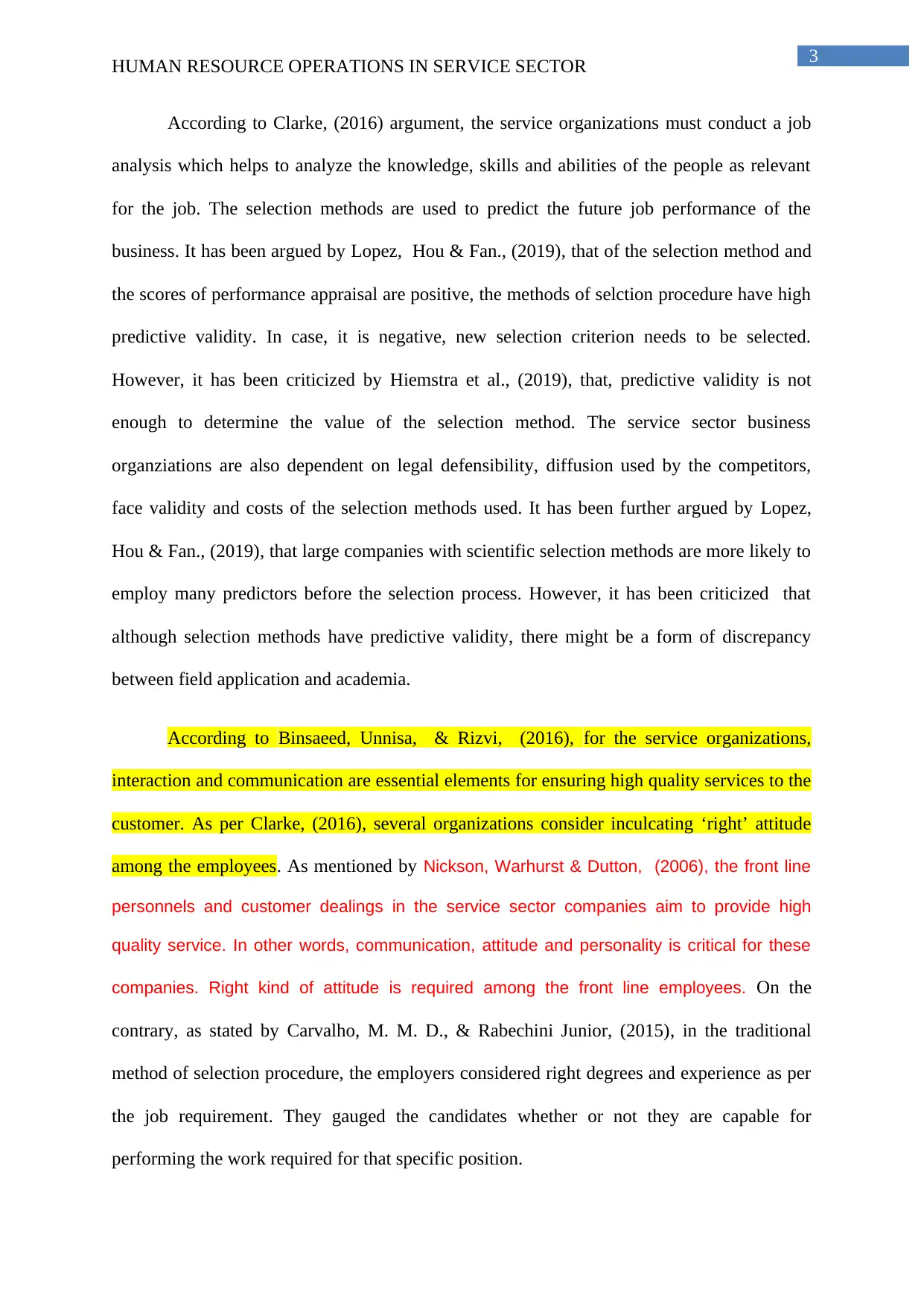
3
HUMAN RESOURCE OPERATIONS IN SERVICE SECTOR
According to Clarke, (2016) argument, the service organizations must conduct a job
analysis which helps to analyze the knowledge, skills and abilities of the people as relevant
for the job. The selection methods are used to predict the future job performance of the
business. It has been argued by Lopez, Hou & Fan., (2019), that of the selection method and
the scores of performance appraisal are positive, the methods of selction procedure have high
predictive validity. In case, it is negative, new selection criterion needs to be selected.
However, it has been criticized by Hiemstra et al., (2019), that, predictive validity is not
enough to determine the value of the selection method. The service sector business
organziations are also dependent on legal defensibility, diffusion used by the competitors,
face validity and costs of the selection methods used. It has been further argued by Lopez,
Hou & Fan., (2019), that large companies with scientific selection methods are more likely to
employ many predictors before the selection process. However, it has been criticized that
although selection methods have predictive validity, there might be a form of discrepancy
between field application and academia.
According to Binsaeed, Unnisa, & Rizvi, (2016), for the service organizations,
interaction and communication are essential elements for ensuring high quality services to the
customer. As per Clarke, (2016), several organizations consider inculcating ‘right’ attitude
among the employees. As mentioned by Nickson, Warhurst & Dutton, (2006), the front line
personnels and customer dealings in the service sector companies aim to provide high
quality service. In other words, communication, attitude and personality is critical for these
companies. Right kind of attitude is required among the front line employees. On the
contrary, as stated by Carvalho, M. M. D., & Rabechini Junior, (2015), in the traditional
method of selection procedure, the employers considered right degrees and experience as per
the job requirement. They gauged the candidates whether or not they are capable for
performing the work required for that specific position.
HUMAN RESOURCE OPERATIONS IN SERVICE SECTOR
According to Clarke, (2016) argument, the service organizations must conduct a job
analysis which helps to analyze the knowledge, skills and abilities of the people as relevant
for the job. The selection methods are used to predict the future job performance of the
business. It has been argued by Lopez, Hou & Fan., (2019), that of the selection method and
the scores of performance appraisal are positive, the methods of selction procedure have high
predictive validity. In case, it is negative, new selection criterion needs to be selected.
However, it has been criticized by Hiemstra et al., (2019), that, predictive validity is not
enough to determine the value of the selection method. The service sector business
organziations are also dependent on legal defensibility, diffusion used by the competitors,
face validity and costs of the selection methods used. It has been further argued by Lopez,
Hou & Fan., (2019), that large companies with scientific selection methods are more likely to
employ many predictors before the selection process. However, it has been criticized that
although selection methods have predictive validity, there might be a form of discrepancy
between field application and academia.
According to Binsaeed, Unnisa, & Rizvi, (2016), for the service organizations,
interaction and communication are essential elements for ensuring high quality services to the
customer. As per Clarke, (2016), several organizations consider inculcating ‘right’ attitude
among the employees. As mentioned by Nickson, Warhurst & Dutton, (2006), the front line
personnels and customer dealings in the service sector companies aim to provide high
quality service. In other words, communication, attitude and personality is critical for these
companies. Right kind of attitude is required among the front line employees. On the
contrary, as stated by Carvalho, M. M. D., & Rabechini Junior, (2015), in the traditional
method of selection procedure, the employers considered right degrees and experience as per
the job requirement. They gauged the candidates whether or not they are capable for
performing the work required for that specific position.
Paraphrase This Document
Need a fresh take? Get an instant paraphrase of this document with our AI Paraphraser
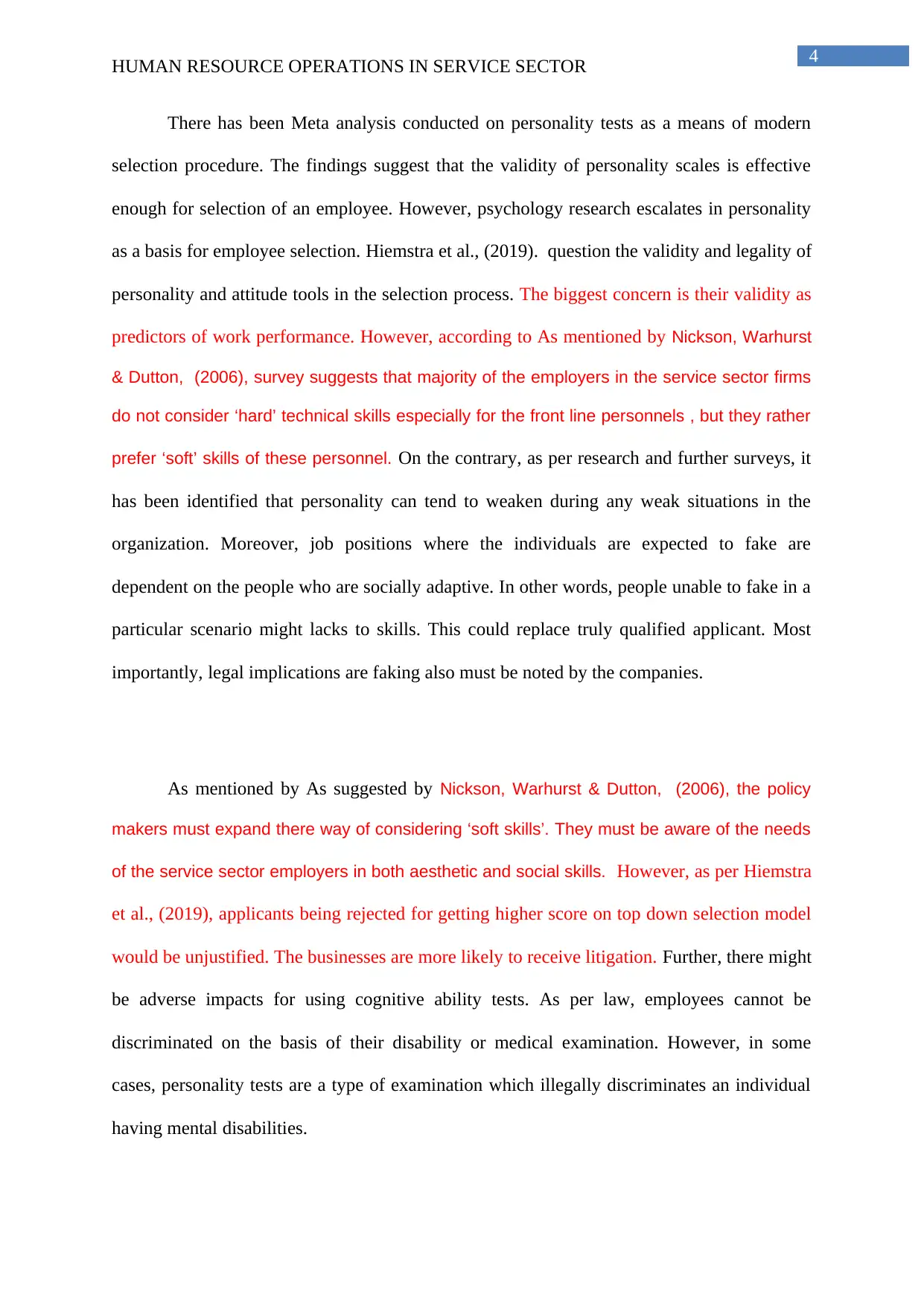
4
HUMAN RESOURCE OPERATIONS IN SERVICE SECTOR
There has been Meta analysis conducted on personality tests as a means of modern
selection procedure. The findings suggest that the validity of personality scales is effective
enough for selection of an employee. However, psychology research escalates in personality
as a basis for employee selection. Hiemstra et al., (2019). question the validity and legality of
personality and attitude tools in the selection process. The biggest concern is their validity as
predictors of work performance. However, according to As mentioned by Nickson, Warhurst
& Dutton, (2006), survey suggests that majority of the employers in the service sector firms
do not consider ‘hard’ technical skills especially for the front line personnels , but they rather
prefer ‘soft’ skills of these personnel. On the contrary, as per research and further surveys, it
has been identified that personality can tend to weaken during any weak situations in the
organization. Moreover, job positions where the individuals are expected to fake are
dependent on the people who are socially adaptive. In other words, people unable to fake in a
particular scenario might lacks to skills. This could replace truly qualified applicant. Most
importantly, legal implications are faking also must be noted by the companies.
As mentioned by As suggested by Nickson, Warhurst & Dutton, (2006), the policy
makers must expand there way of considering ‘soft skills’. They must be aware of the needs
of the service sector employers in both aesthetic and social skills. However, as per Hiemstra
et al., (2019), applicants being rejected for getting higher score on top down selection model
would be unjustified. The businesses are more likely to receive litigation. Further, there might
be adverse impacts for using cognitive ability tests. As per law, employees cannot be
discriminated on the basis of their disability or medical examination. However, in some
cases, personality tests are a type of examination which illegally discriminates an individual
having mental disabilities.
HUMAN RESOURCE OPERATIONS IN SERVICE SECTOR
There has been Meta analysis conducted on personality tests as a means of modern
selection procedure. The findings suggest that the validity of personality scales is effective
enough for selection of an employee. However, psychology research escalates in personality
as a basis for employee selection. Hiemstra et al., (2019). question the validity and legality of
personality and attitude tools in the selection process. The biggest concern is their validity as
predictors of work performance. However, according to As mentioned by Nickson, Warhurst
& Dutton, (2006), survey suggests that majority of the employers in the service sector firms
do not consider ‘hard’ technical skills especially for the front line personnels , but they rather
prefer ‘soft’ skills of these personnel. On the contrary, as per research and further surveys, it
has been identified that personality can tend to weaken during any weak situations in the
organization. Moreover, job positions where the individuals are expected to fake are
dependent on the people who are socially adaptive. In other words, people unable to fake in a
particular scenario might lacks to skills. This could replace truly qualified applicant. Most
importantly, legal implications are faking also must be noted by the companies.
As mentioned by As suggested by Nickson, Warhurst & Dutton, (2006), the policy
makers must expand there way of considering ‘soft skills’. They must be aware of the needs
of the service sector employers in both aesthetic and social skills. However, as per Hiemstra
et al., (2019), applicants being rejected for getting higher score on top down selection model
would be unjustified. The businesses are more likely to receive litigation. Further, there might
be adverse impacts for using cognitive ability tests. As per law, employees cannot be
discriminated on the basis of their disability or medical examination. However, in some
cases, personality tests are a type of examination which illegally discriminates an individual
having mental disabilities.
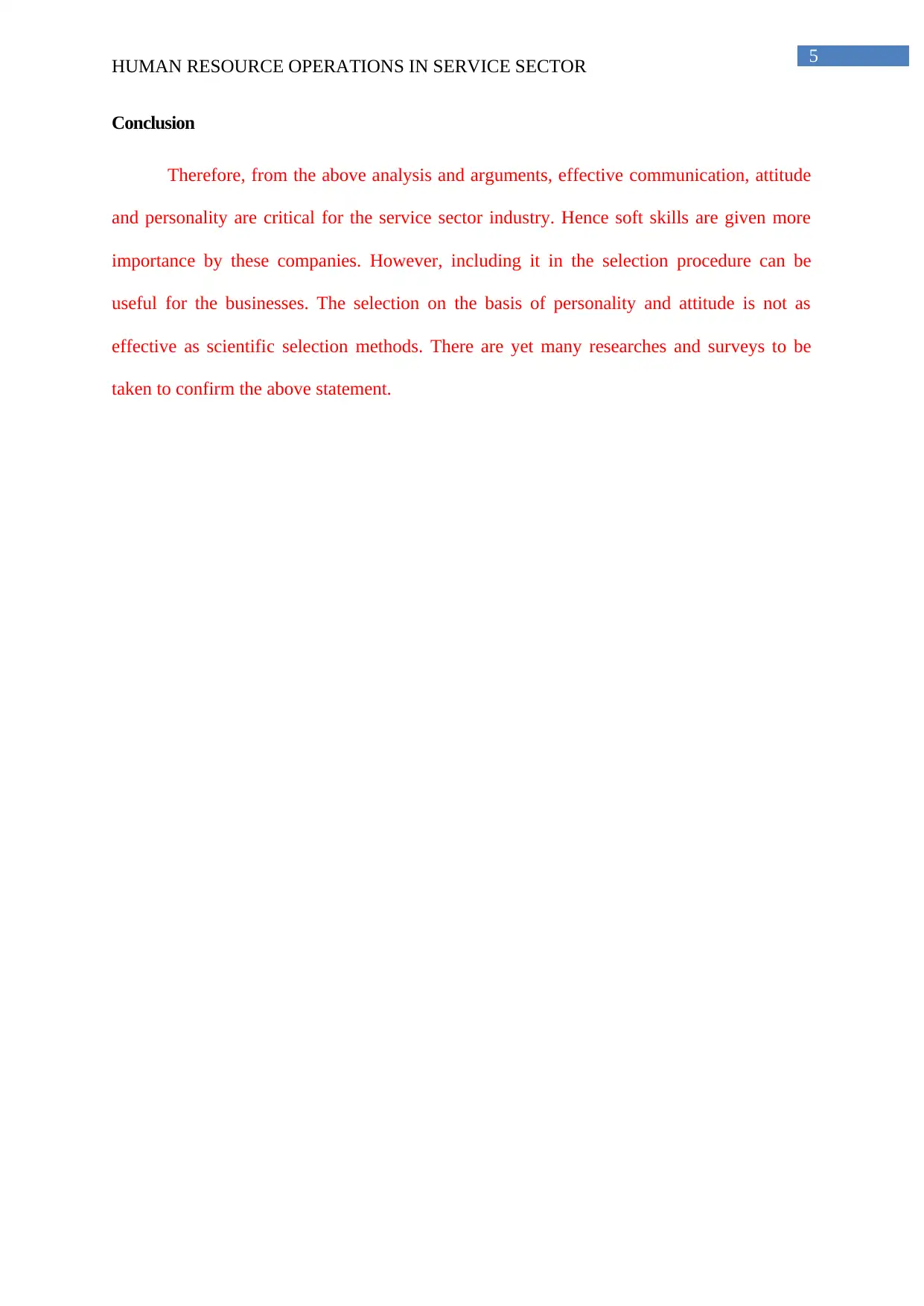
5
HUMAN RESOURCE OPERATIONS IN SERVICE SECTOR
Conclusion
Therefore, from the above analysis and arguments, effective communication, attitude
and personality are critical for the service sector industry. Hence soft skills are given more
importance by these companies. However, including it in the selection procedure can be
useful for the businesses. The selection on the basis of personality and attitude is not as
effective as scientific selection methods. There are yet many researches and surveys to be
taken to confirm the above statement.
HUMAN RESOURCE OPERATIONS IN SERVICE SECTOR
Conclusion
Therefore, from the above analysis and arguments, effective communication, attitude
and personality are critical for the service sector industry. Hence soft skills are given more
importance by these companies. However, including it in the selection procedure can be
useful for the businesses. The selection on the basis of personality and attitude is not as
effective as scientific selection methods. There are yet many researches and surveys to be
taken to confirm the above statement.
⊘ This is a preview!⊘
Do you want full access?
Subscribe today to unlock all pages.

Trusted by 1+ million students worldwide
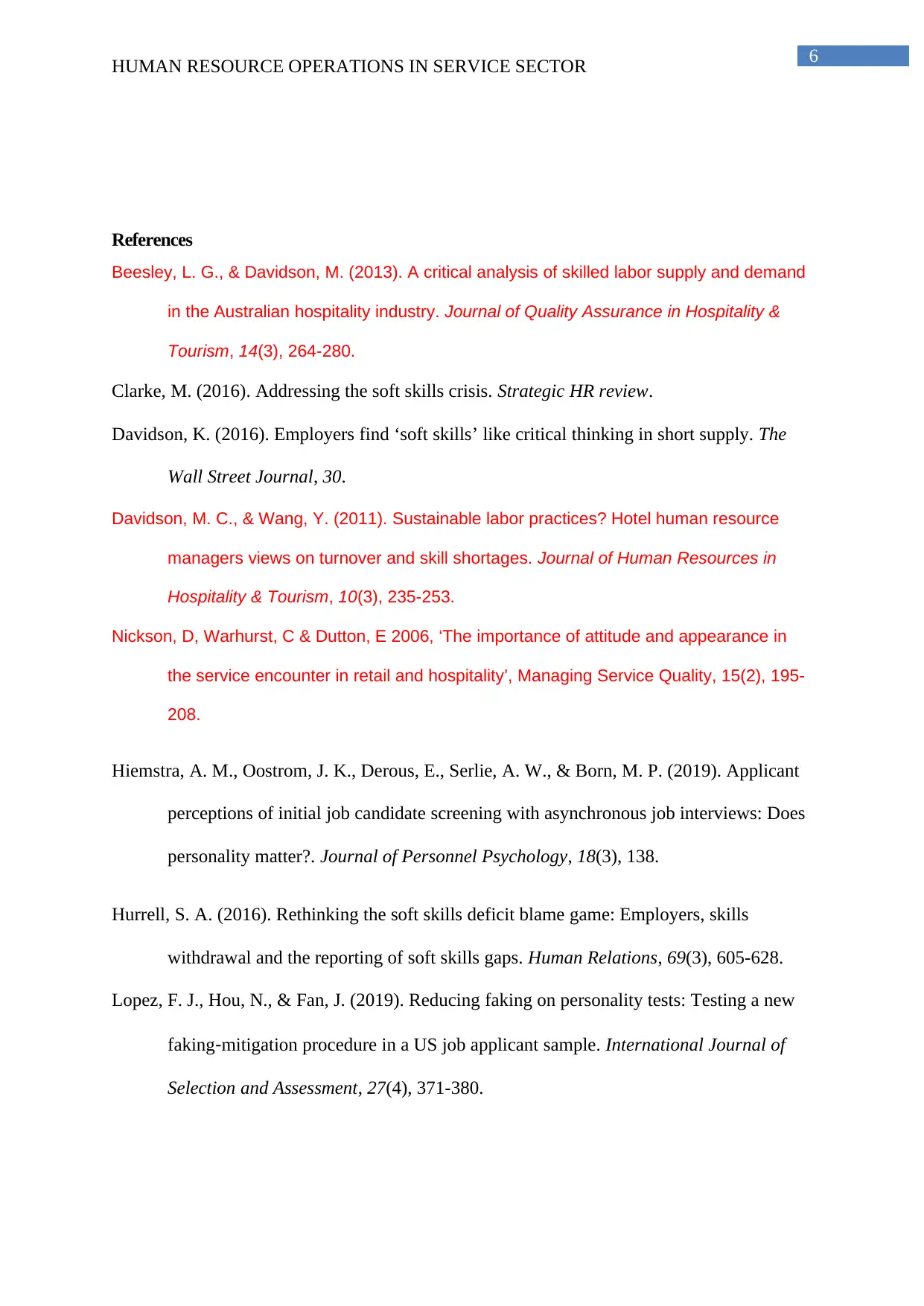
6
HUMAN RESOURCE OPERATIONS IN SERVICE SECTOR
References
Beesley, L. G., & Davidson, M. (2013). A critical analysis of skilled labor supply and demand
in the Australian hospitality industry. Journal of Quality Assurance in Hospitality &
Tourism, 14(3), 264-280.
Clarke, M. (2016). Addressing the soft skills crisis. Strategic HR review.
Davidson, K. (2016). Employers find ‘soft skills’ like critical thinking in short supply. The
Wall Street Journal, 30.
Davidson, M. C., & Wang, Y. (2011). Sustainable labor practices? Hotel human resource
managers views on turnover and skill shortages. Journal of Human Resources in
Hospitality & Tourism, 10(3), 235-253.
Nickson, D, Warhurst, C & Dutton, E 2006, ‘The importance of attitude and appearance in
the service encounter in retail and hospitality’, Managing Service Quality, 15(2), 195-
208.
Hiemstra, A. M., Oostrom, J. K., Derous, E., Serlie, A. W., & Born, M. P. (2019). Applicant
perceptions of initial job candidate screening with asynchronous job interviews: Does
personality matter?. Journal of Personnel Psychology, 18(3), 138.
Hurrell, S. A. (2016). Rethinking the soft skills deficit blame game: Employers, skills
withdrawal and the reporting of soft skills gaps. Human Relations, 69(3), 605-628.
Lopez, F. J., Hou, N., & Fan, J. (2019). Reducing faking on personality tests: Testing a new
faking‐mitigation procedure in a US job applicant sample. International Journal of
Selection and Assessment, 27(4), 371-380.
HUMAN RESOURCE OPERATIONS IN SERVICE SECTOR
References
Beesley, L. G., & Davidson, M. (2013). A critical analysis of skilled labor supply and demand
in the Australian hospitality industry. Journal of Quality Assurance in Hospitality &
Tourism, 14(3), 264-280.
Clarke, M. (2016). Addressing the soft skills crisis. Strategic HR review.
Davidson, K. (2016). Employers find ‘soft skills’ like critical thinking in short supply. The
Wall Street Journal, 30.
Davidson, M. C., & Wang, Y. (2011). Sustainable labor practices? Hotel human resource
managers views on turnover and skill shortages. Journal of Human Resources in
Hospitality & Tourism, 10(3), 235-253.
Nickson, D, Warhurst, C & Dutton, E 2006, ‘The importance of attitude and appearance in
the service encounter in retail and hospitality’, Managing Service Quality, 15(2), 195-
208.
Hiemstra, A. M., Oostrom, J. K., Derous, E., Serlie, A. W., & Born, M. P. (2019). Applicant
perceptions of initial job candidate screening with asynchronous job interviews: Does
personality matter?. Journal of Personnel Psychology, 18(3), 138.
Hurrell, S. A. (2016). Rethinking the soft skills deficit blame game: Employers, skills
withdrawal and the reporting of soft skills gaps. Human Relations, 69(3), 605-628.
Lopez, F. J., Hou, N., & Fan, J. (2019). Reducing faking on personality tests: Testing a new
faking‐mitigation procedure in a US job applicant sample. International Journal of
Selection and Assessment, 27(4), 371-380.
Paraphrase This Document
Need a fresh take? Get an instant paraphrase of this document with our AI Paraphraser
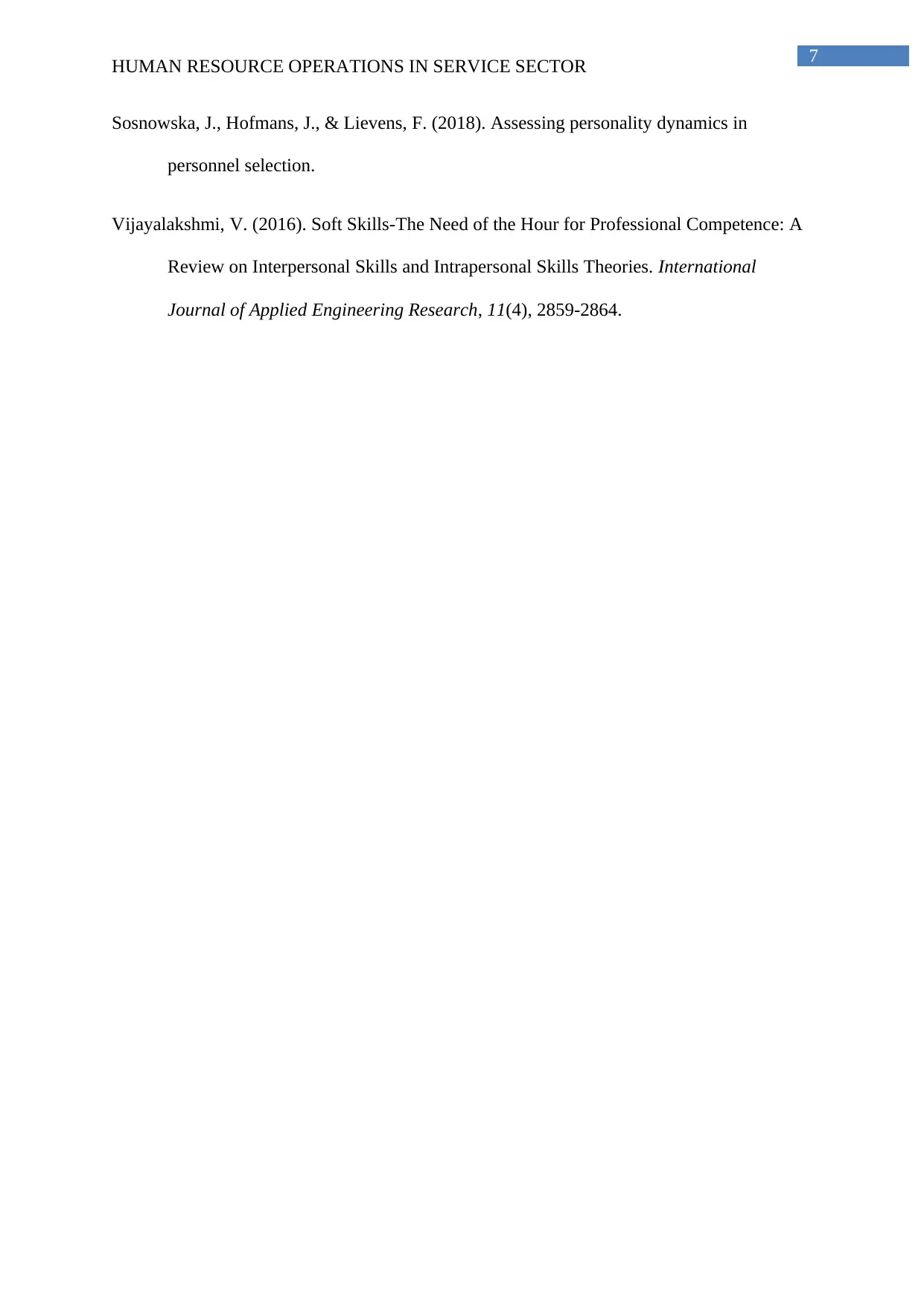
7
HUMAN RESOURCE OPERATIONS IN SERVICE SECTOR
Sosnowska, J., Hofmans, J., & Lievens, F. (2018). Assessing personality dynamics in
personnel selection.
Vijayalakshmi, V. (2016). Soft Skills-The Need of the Hour for Professional Competence: A
Review on Interpersonal Skills and Intrapersonal Skills Theories. International
Journal of Applied Engineering Research, 11(4), 2859-2864.
HUMAN RESOURCE OPERATIONS IN SERVICE SECTOR
Sosnowska, J., Hofmans, J., & Lievens, F. (2018). Assessing personality dynamics in
personnel selection.
Vijayalakshmi, V. (2016). Soft Skills-The Need of the Hour for Professional Competence: A
Review on Interpersonal Skills and Intrapersonal Skills Theories. International
Journal of Applied Engineering Research, 11(4), 2859-2864.
1 out of 8
Related Documents
Your All-in-One AI-Powered Toolkit for Academic Success.
+13062052269
info@desklib.com
Available 24*7 on WhatsApp / Email
![[object Object]](/_next/static/media/star-bottom.7253800d.svg)
Unlock your academic potential
Copyright © 2020–2026 A2Z Services. All Rights Reserved. Developed and managed by ZUCOL.





